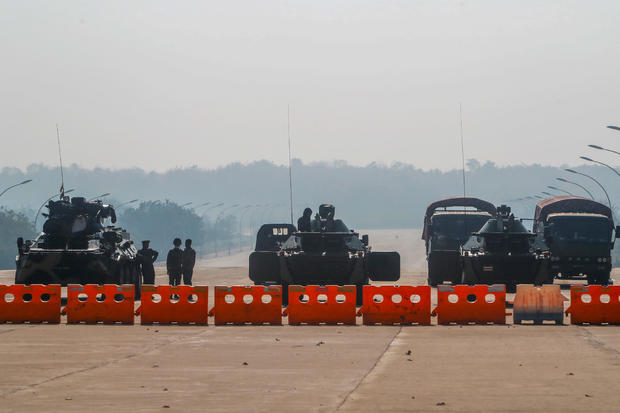Beijing — The military takeover in Myanmar and detention of Aung San Suu Kyi was "a major cabinet reshuffle" according to Chinese state media, which rolled out the euphemisms to avoid calling it a coup. As democratic leaders around the world slammed the Burmese military and President Joe Biden said the U.S. was "taking note" of who was standing up for Myanmar's people, China's communist leadership took a softly-softly approach.
Beijing called for all parties in Myanmar to "resolve their differences," and the official Xinhua news agency on Monday described the military replacing elected ministers after the coup as a "major cabinet reshuffle."
The nationalist Global Times meanwhile quoted unnamed experts as saying the generals' power-grab could be seen as "an adjustment to the country's dysfunctional power structure."
The paper — known for its fiery commentaries against China's critics — also used the occasion to take a pop at former U.S. president Donald Trump, whose combative approach to Beijing had plunged U.S.-China ties to their lowest in decades.
"Some experts mentioned that... Trump, who refused to admit his election defeat and reportedly incited the Capitol riots, might be the Myanmar military's inspiration," it wrote.
Beijing has long rebuffed what it sees as interference in its "internal affairs" — such as criticism over its human rights record — and has taken a similarly neutral stance on most foreign affairs.
Myanmar is also a vital piece of Beijing's huge Belt and Road infrastructure initiative. President Xi Jinping visited the country last January, and promised to support the Myanmar government on a development path "suited to its own national conditions."
China, the U.N., and leverage
European officials, on the other hand, were quick to condemn the takeover, labelling it unequivocally a coup. Many others, including President Biden in the U.S. and the head of the United Nations, slammed the military's actions and called for an immediate restoration of democracy in Myanmar, but did not use the word "coup."
Using the label could carry legal implications for the U.S. government's ability to provide aid to the people of Myanmar, and with the United Nations Security Council set to take up the issue later on Tuesday, the Biden administration appeared to be waiting to muster support for a coordinated international response.
Myanmar's military has justified its power grab by alleging widespread fraud in elections held three months ago that the NLD won in a landslide. It has imposed a state of emergency for one year, after which it says it will hold fresh elections.
So far China, and to a slightly lesser extent Russia, have been the only nations willing to defend the military's actions in Myanmar, which was previously known as Burma and is still called that by the U.S. government.
Russia used extremely gentle rhetoric in describing the military's takeover, suggesting it was merely an internal disagreement over "differences that arose following the results of the parliamentary elections."
"We hope for a peaceful settlement of the situation in accordance with the current legislation through the resumption of political dialogue," the Russian Foreign Ministry said in a statement on Monday, adding, pointedly, that it had "paid attention to the statement of the military authorities about their intention to hold new parliamentary elections in a year."
Crucially, as permanent members of the U.N. Security Council both China and Russia wield veto power over any resolutions proposed within that body, so they could thwart efforts led by other countries to impose multilateral sanctions on the military-run regime in Myanmar — or even to formally label it's actions a coup.
The U.S. can act unilaterally, and the Biden administration has vowed to "take action against those responsible" if the Burmese military fails to "reverse these actions immediately."
But as Asia analysts at the Washington-based Center for Strategic and International Studies wrote in a Monday note on Myanmar, the U.S. government's leverage over the new military leadership is limited by Washington's relatively small investment footprint in the country.
"Despite a decade of opening, U.S. businesses remain relatively modest players in the Myanmar economy," the CSIS analysts said. "Those that have invested are mainly geared at providing goods and services to the domestic market in Myanmar, which means their departure will mostly harm private citizens. U.S. businesses have stayed away from the natural resource extraction and commodities export sectors in which the military is heavily invested."
The analysts said the effectiveness of any punitive measures imposed by Washington will hinge on support from other Asian nations, which have closer business ties with Myanmar. That support, however — even from close allies — may be difficult to solidify.
"It will be more difficult for the United States to get major investors in Myanmar, like Japan and Singapore, to follow suit. And the largest foreign player in Myanmar's economy, China, will be all too happy to recalibrate its engagement to recognize the new facts on the ground," said the CSIS. "That will likely soften the blow of any U.S. sanctions."
"stage" - Google News
February 02, 2021 at 06:12PM
https://ift.tt/36CowAy
Myanmar military's power grab sets stage for Biden admin's first U.N. showdown with China and Russia - CBS News
"stage" - Google News
https://ift.tt/2xC8vfG
https://ift.tt/2KXEObV
Bagikan Berita Ini

















0 Response to "Myanmar military's power grab sets stage for Biden admin's first U.N. showdown with China and Russia - CBS News"
Post a Comment